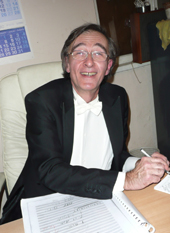Matchavariani , the man with the answers
By Rumwold Leigh
Monday, November 17

The concert began with Matchavariani’s Third Symphonic Suite from the ballet Othello. This was first performed in 1957 at the Tbilisi State Opera, and swiftly achieved international recognition, being staged in many cities worldwide. On the basis of the music alone, you can see why. All Soviet-period pieces have a particular style, their insistent strings conveying the notion that the indefensible can be somehow explained. Matchavariani’s music turns this on its head, by combining this with a warm lyricism and deep devotion to music itself which puts this intellectualism into context. Yes, that part of life exists, but we all have a fundamental humanity, expressed through soaring violin lines, superb orchestration and organic harmony and counterpoint, which is the nature of us all. Cut the crap, we are what we are. People did seem to be a bit taller after hearing this music, and seeing how Vakhtang Matchavariani instilled the sense of the importance of this work, that it had a universality beyond ‘interpretation.’
The first half concluded with three romances, settings of poems by famous Georgian authors. These were sung by soprano Marika Gulordava, who demonstrated immense control, refined judgment and huge technical excellence. In short, she made these pieces so much her own that few would be bold enough to follow her. An unscheduled performance of a piece by a young amateur composer Jimmy Chkhaidze in the audience was a fine and welcome gesture.
The second half of the concert was the premiere of symphonic suite The Taming of the Shrew. This was a thoroughly enjoyable romp, Shakespeare’s Shrew reappearing in a motif when least expected, emotion suddenly leavened by playfulness, argument dissolving into the drama that had created it. This is was what Shakespeare would have composed himself, as Matchavariani clearly had the same connection with truth that Shakespeare had, and knew exactly what to do about it. There is more to come: the second part of this piece is to be orchestrated in the near future.
The audience was deeply appreciative of both music and performance, as any audience would have been. Matchavariani thoroughly deserves a more prominent place in the classical canon.
